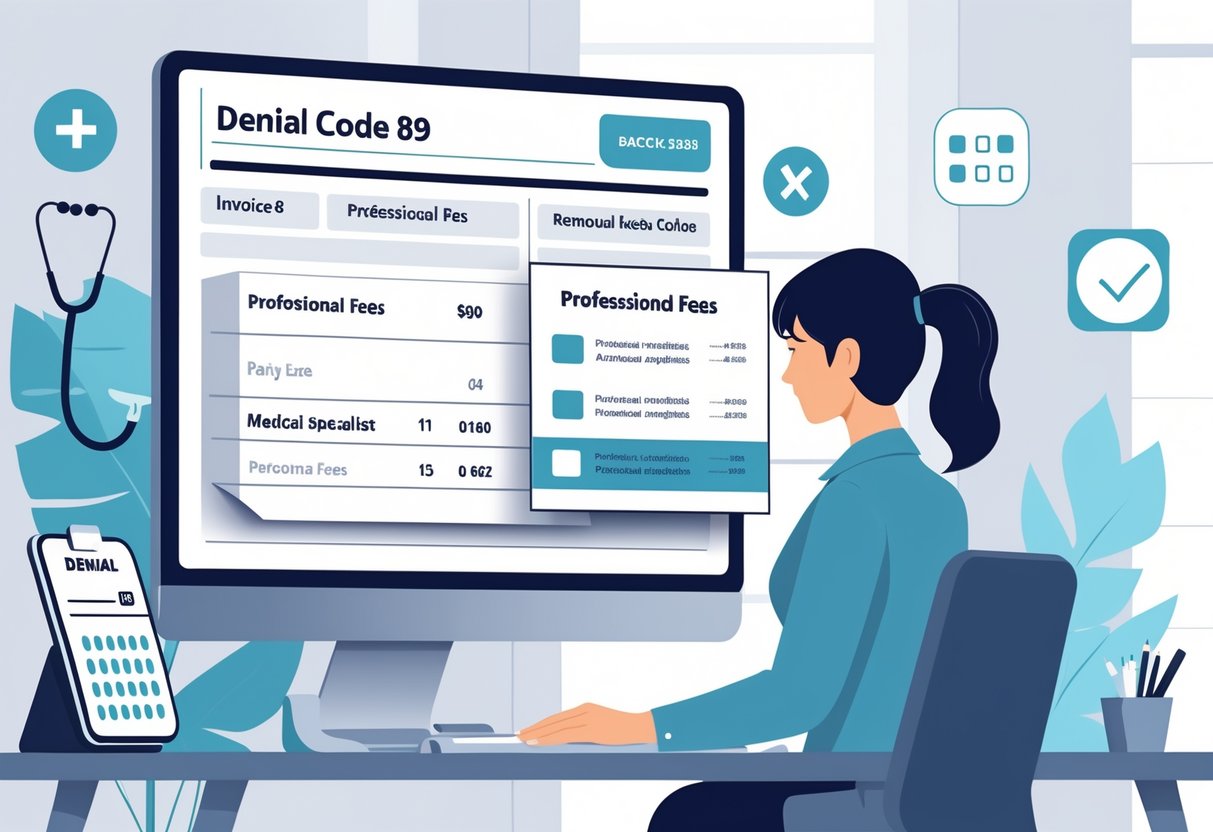Denial code 89 means professional fees have been removed from the charges you submitted. This usually happens when the payer decides that those fees are not covered or should be billed differently.
Understanding denial code 89 helps you fix your claim and get the correct payment for your services. Knowing why the fees were removed lets you respond quickly and avoid losing money.
If you want to handle these denials effectively, you need to know the common reasons behind the removal and how to prevent this issue in future claims.
Understanding Denial Code 89 – Professional Fees Removed From Charges

Denial code 89 means a claim was rejected because professional fees were taken out of the total charges. It usually happens when the payer finds fees that should not be billed separately or were included incorrectly. You need to check what fees were removed and why.
Definition and Description
Denial code 89 indicates the insurance payer has removed professional fees from your claim’s charges. This means the fees related to services provided by doctors or other professionals are not being paid as billed. The denial can occur because they believe the fees were included in another payment or weren’t eligible for separate reimbursement.
You should review your billing to see which professional fees were contested. Sometimes these fees are bundled with facility charges, so they are not paid individually. Understanding exactly what was removed can help you adjust your billing or appeal.
Common Scenarios for Occurrence
You may see denial code 89 if you bill for physician fees that insurance considers part of a global procedure. For example, surgical fees often include both the surgeon’s work and related professional services.
This denial also occurs if the payer thinks you duplicated charges by billing professional fees separately from the facility charges or if the fees don’t match covered services. Incorrect coding is another cause — such as using a code that includes professional services when billed independently.
Applicable Payers and Medical Claims Types
Denial code 89 is common with Medicare, Medicaid, and many commercial insurance payers. It most often appears on professional claims (CMS-1500 form) but can also come up on facility claims (UB-04) when billing conflicts arise between service types.
You will typically encounter this denial in surgical, consultation, and evaluation claims where professional services overlap with other payments. Knowing which payers use this code helps you tailor your appeals and documentation properly to each insurer.
Reasons for Professional Fees Removal

Professional fees may be removed from charges due to specific rules and agreements that affect how services are billed. These include how services are grouped, if charges overlap, and contract terms that control payment.
Bundled Services and Global Periods
You may see fees removed when services are included in a bundled payment. Bundled services group several related charges into one single fee. For example, if a surgery and follow-up care are billed together, the separate professional fees might be denied.
The global period also impacts billing. This is a set time after a procedure when certain services are considered part of the original charge. If you bill professional fees during this period, they might be rejected because they are covered under the global fee.
Duplicate or Inappropriate Billing
Professional fees can be removed if you submit charges that duplicate others already billed. If two providers bill the same service or charge for the same time period, one set of fees will be denied.
Inappropriate billing happens when professional fees are charged for services that do not meet payer guidelines. For example, billing for a consult when the visit was not documented as such. You must ensure the fees you submit match the service performed.
Contractual Agreements Impact
Your contract with payers plays a key role in fee removals. Some agreements specify that certain fees are not reimbursable or should be included in other payments.
These contracts often outline what fees are allowed, how they must be billed, and any limits. If you bill outside these rules, professional fees may be removed to comply with the contract conditions. You should review your contracts carefully to avoid rejected charges.
Claim Submission Guidelines for Avoiding Denial Code 89
To prevent Denial Code 89, you must submit claims with accurate coding, thorough documentation, and clear coordination between providers. Missing or incorrect details can cause the removal of professional fees from your charges.
Proper Coding Practices
You need to use the correct CPT and HCPCS codes for every professional service billed. Avoid duplicating codes that represent the same work performed by different providers without proper modifiers.
Make sure you apply modifiers like 26 (professional component) or TC (technical component) correctly to separate professional fees from technical services. This avoids confusion about which part of the service is being billed.
Verify your codes match with payer guidelines before submission. Incorrect or incomplete codes often lead to denial because insurers cannot recognize the billed professional service.
Documentation Requirements
You must include documentation that clearly supports the professional service billed. This means your notes need to show the provider’s involvement, such as evaluation, interpretation, or direct patient care.
Attach reports, signed notes, or electronic medical records demonstrating the service was provided. Without proof of professional work, payers will remove those fees from your charges.
Keep documentation organized and easy to follow. If you rely on electronic records, ensure all relevant pages are included and legible when sending claims.
Coordination Between Providers
If multiple providers are involved, communicate clearly about which provider is billing for professional fees. Avoid billing the same fee twice for services done by different staff.
Establish a process or system that tracks who submits charges for professional services to prevent overlap or missed billing. This reduces errors that cause Denial Code 89.
Share relevant documentation between providers to validate each person’s role. This coordination makes your claim stronger and less prone to professional fees being removed.
Resolving Denial Code 89 on Medical Claims
You need to carefully review your claim and gather all necessary documents to correct the denial. Follow a clear process to appeal the decision and provide the right information for reconsideration.
Step-by-Step Appeal Process
First, identify the reason your claim was denied with code 89, which means professional fees were removed. Check if these fees were billed separately or combined incorrectly.
Next, contact the payer for specific instructions on appealing. Prepare a formal appeal letter that explains why the fees should be included. Be clear and reference relevant billing codes, contracts, or policies that support your case.
Submit your appeal along with all required documents by the payer’s deadline. Track your appeal status and respond promptly if more information is requested. Persistence helps in getting your fees reconsidered.
Essential Records for Reconsideration
Gather all records that prove the professional fees are valid charges. This includes detailed billing statements showing the fees separately.
Attach medical records or provider notes to verify the services provided. Any original claims or corrected claim forms should also be included.
Keep copies of your communications with the payer, appeal letters, and any responses received. Organized records make your appeal stronger and easier to follow.
Financial Implications and Best Practices
You need to understand how denial code 89 affects your payments and what steps you can take to reduce these denials. Knowing the financial risks and prevention tips will help protect your revenue.
Impact on Provider Revenue
Denial code 89 means professional fees are removed from your charges. This directly lowers the amount you get paid. If this happens often, it can create cash flow problems.
You might see delayed payments or the need to re-submit claims. Each denial adds extra work and overhead costs for your billing team. Over time, this reduces your total income from services.
Tracking how often you get this denial helps identify weak points. The less frequent the denials, the better your revenue stability.
Preventing Future Denials
To stop this denial, check that your claims clearly separate professional fees from other charges. Make sure your documentation supports the fees you bill.
Verify payer rules before submitting. Some insurers require specific forms or codes to accept professional fees.
Use billing software with up-to-date payer rules. Regular staff training ensures your team submits claims correctly.
If you spot a denial, respond quickly with corrected claim info. Acting fast improves your chances of getting paid without losing revenue.
Frequently Asked Questions
You may need to know why denial code 89 happens, what to do after receiving it, and how to prevent it in the future. Handling this denial often involves reviewing the claim details and gathering the right documents for appeal.
What are common reasons for receiving denial code 89 on a claim submission?
Denial code 89 usually occurs when an insurer removes professional fees from your charges. This could happen if the insurer believes those fees are included in a bundled service or already reimbursed.
How can a provider address an insurer’s use of denial code 89 to remove professional fees?
You must check if the professional fees were properly itemized and not duplicated in other charges. Providing clear billing details helps show that the fees are separate and valid for payment.
What steps should be taken to correct a claim that has been denied with code 89?
First, review the claim for any errors. Then, resend the corrected claim with proper documentation explaining the professional fees. Follow up with the insurer to ensure the update is processed.
Are there preventive measures to avoid encountering denial code 89 on future submissions?
Ensure all professional fees are clearly listed and not included in global or bundled charges. You should also review insurer billing guidelines regularly to stay compliant with their rules.
Can denial code 89 be disputed, and what is the process for such a dispute?
Yes, you can dispute denial code 89. Submit a formal appeal with supporting documents showing the fees were not included elsewhere. Keep track of deadlines and follow insurer appeal procedures carefully.
What documentation is required to resolve a denial code 89 and recover the professional fees?
Provide itemized bills, explanation of services, and notes supporting the separate charges. Any proof that the fees are not part of bundled payments will help in resolving the denial.








1 thought on “Denial Code CO 89 – Professional Fees Removed from Charges Explained and Resolved”